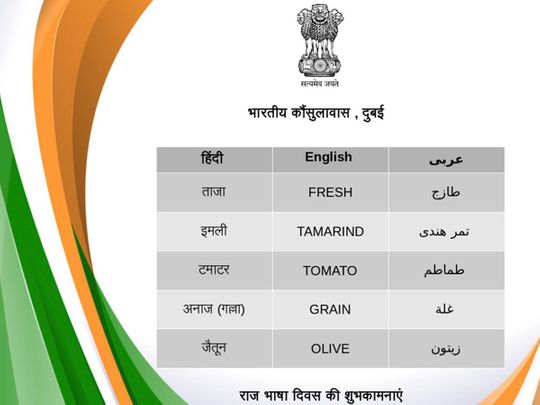How come Indians in Dubai are tweeting so many Arabic words?
[ad_1]

Image Credit: Supplied
Dubai: It is World Hindi Day on September 14, but Indians in Dubai tweeted Arabic words to mark the day. The reason—the Indian Consulate in Dubai invited tweeps to share words which are common in Arabic and Hindi.
In the previous years, the consulate had hosted Hindi poetry sessions and other events to celebrate Hindi Diwas. The mission found the innovative way of celebrating the day during the COVID-19 pandemic by linking it with the local language and culture.
“To celebrate Hindi Diwas, CGI Dubai invites all to write a word in Hindi and it’s translation in English and Arabic language (optional). Also invite people to find words which are common in Arabic language and Hindi Language with hashtag #WordOfHindi,,” (sic), the consulate posted on Twitter.
This inspired people to tweet words ranging from kanun (law) to kalam (pen) which are commonly used in both Arabic and Hindi. While some people tweeted one word each, some others attempted to post as many loanwords from Arabic as possible.
Neeraj Agrawal, consul for Press, Information and Culture at the consulate, who proposed the idea, told Gulf News that the exchange of words in the languages was also a testimony to the rich cultural ties that India had with Arab countries for centuries.
Ever since Arabs landed in the Indian subcontinent centuries ago, he said hundreds of words have been adapted from Arabic to Hindi.
Agrawal, who has done an advanced level certification course in Arabic in Dubai, said he had noticed several Arabic words commonly used in day-to-day Hindi conversations.
“This shows the centuries-old traditions and connections. Many words were adapted from the time Arab merchants and Indian traders started interacting centuries ago. There were many Arab scholars in the courts of the Delhi Sultanate in early 11th century. Arabic and Persian languages even became the languages of the court then,” he explained.
“It would be interesting for people to find the similarities between the languages. Hence, we initiated the campaign on the occasion of the Hindi Diwas,” said Agrawal.
Emiratis speak fluent Hindi
“Many Emiratis speak Hindi fluently. Hindi is also the third official language [after Arabic and English] adopted by the judicial department of Abu Dhabi. It is a matter of great honour to India and signifies the strong ties between the UAE and India,” he added.
The Indian Embassy in Abu Dhbai, meanwhile, urged tweeps to start posting one Hindi word a day with its Arabic translation. The mission posted the word Dosti-Friendship for the day with the hashtag #UAEIndiaDosti.
Arabs sing Hindi songs
Elsewhere in Lebanon, the Indian Embassy tweeted videos of Arabs speaking and singing in Hindi as part of the Hindi Day celebrations.
Some of them sang popular Bollywood songs to acknowledge their love for the language and the movies from India.
More about Hindi Diwas
The Hindi Diwas (Day) is celebrated to commemorate the inclusion of Hindi as one of the two official languages of India by the Constituent Assembly of India on September 14, 1949.
It also commemorates the luminaries of Hindi literature such as Beohar Rajendra Simha on whose 50th birthday Hindi was adopted as the official language of India. Derived from Sanskrit and written in Devanagari script, Hindi is among the 22 scheduled languages of India.
Hindi got its name from the Persian word ‘Hind’, meaning ‘land of the Indus River’.
Hindi is also the third official language after Arabic and English adopted by the judicial department of Abu Dhabi.
While Hindi is widely known by Indians, it is predominantly spoken in northern, western and northeastern states of India.
The decision to mark September 14 as Hindi Diwas was taken by India’s first Prime Minister Jawaharlal Nehru in 1953.
Here are some of the commonly used Arabic words in Hindi with their transliteration and translation in English:
[ad_2]
Source link


